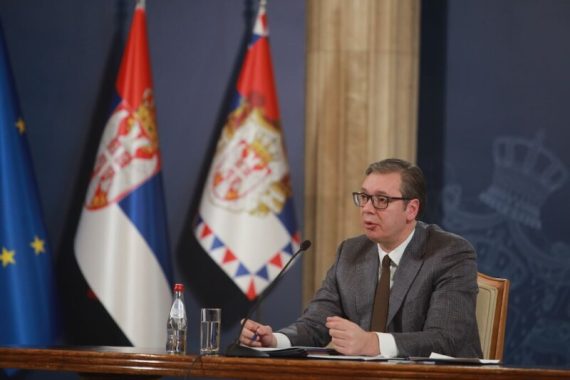O
n March 23, EU Foreign Policy Chief Josep Borrell made an appeal to Serbia and Kosovo to fulfil all provisions of the EU-backed deal reached on March 18 between the two countries.
“The deal was agreed, it has to be implemented, and there is no room for picking and choosing,” the EU’s chief diplomat told journalists en route to the EU leaders’ summit in Brussels.
The Serbia-Kosovo dispute
Kosovo proclaimed its independence on February 17, 2008 in the wake of a war that ended Serbian rule with NATO intervention.
Most UN member states, including the U.S., UK, France, Germany, and Turkey, have recognized Kosovo’s independence.
However, Serbia does not recognize Kosovo and still views it as an integral part of its territory.
What is the deal about?
According to the deal, Serbia would not explicitly recognize Kosovo, but it would have to recognize official documents such as license plates, custom stamps, diplomas, and passports, and stop lobbying against Kosovo’s admission into international bodies.
Serbia has hitherto counted on its ally Russia, a permanent member of the U.N. Security Council, and other countries that do not recognize Kosovo, to block its neighbor’s entrance to the UN.
Parties to the deal would also inaugurate offices in their respective capitals. In exchange, the Serbian minority in Kosovo would be allowed to form an association of Serbian municipalities, amounting to self-governance.
The deal was reached on February 27, 2023, in Brussels. An annex on the implementation of the deal was agreed upon on March 18, 2023 in Ohrid.
As per the annex, the EU committed itself to organizing a donor conference within 150 days to establish an investment and financial aid package for Serbia and Kosovo.
Many countries, including the U.S., UAE, and Turkey, and the EU welcomed the agreement to normalize relations.
Following talks
After talks in Ohrid, Serbian president Aleksandar Vučić told reporters that despite some areas of lingering disagreements, they had a decent conversation.
Vučić pointed out that they have reached a “sort of” agreement on implementing the deal, and that his country’s membership will be conditioned on the enforcement of the deal.
For his part, Kosovo’s prime minister Albin Kurti said the deal meant a de facto recognition of Kosovo.
Borrell said the EU will demand in the strongest terms that both countries abide by the deal if they wish to join the bloc.
Belgrade-Pristina dialogue
The EU initiated the Belgrade-Pristina dialogue in 2011 with a view of reaching a mutually acceptable solution for disputes between Serbia and Kosovo.
After border tensions in North Kosovo broke out last summer, Miroslav Lajčák, the EU special representative for the Belgrade-Pristina dialogue, submitted the EU’s recent blueprint for normalization in September 2022.
The normalization of relations between the two neighbors is set as a precondition by the EU before integration into the bloc.
Recommended
Austria: No alternatives
At a joint press conference with Serbian foreign minister Ivica Dačić in Vienna on March 22, Austrian foreign minister Alexander Schallenberg stressed that there are no alternatives to the normalization agreement between Belgrade and Pristina and that the agreement was fully supported by the EU and the U.S.
Dačić indicated that the agreement did not imply a Serbian recognition of Kosovo and that his country will never let Kosovo into international organizations.
However, in a speech he delivered to the national parliament on March 23, Kosovar PM Kurti said that Kosovo has received guarantees from the U.S. and the EU on the implementation of the agreement to normalize relations.





